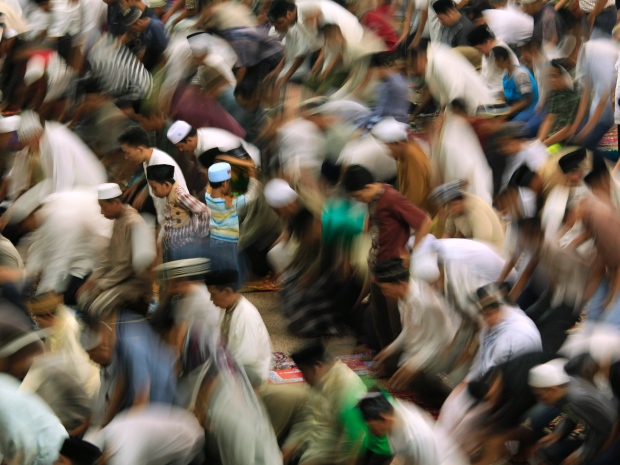Over 300 Killed In Bloody Month Of Terror: Why Have Attacks Seen A Spike During Ramadan?

NEW DELHI: The last month has been particularly brutal as a wave of terror attacks -- from Orlando to Medina -- have claimed over 300 lives. The last month has also been the holy month of Ramadan -- a time of peace, restraint and reflection.
In the last week alone, terror attacks in Jeddah, Medina, Baghdad, Dhaka, Kabul and Istanbul have claimed over 200 lives. On Monday, bombing rocked three cities across Saudi Arabia, including near the Prophet’s Mosque in the holy city of Medina. Although no group claimed responsibility, many have pointed a finger to the Islamic State -- as the group is known to have carried out attacks in Saudi Arabia in a bid to challenge the country’s monarchy. The Medina attack struck the security office of the mosque where the Prophet Muhammad is said to be buried. Four security officers died in the attack, Al Arabiya said, in addition to a suicide bomber. The attack is a direct challenge to the Kingdom’s ruling elite.
Another attack took place in Qatif at a Shiite mosque; no one but the attacker was killed. The third attack was near the United States consulate in Jeddah, when security officers confronted a man acting suspiciously causing him to detonate explosives, killing himself and wounding two guards reported the state-run Saudi Press Agency.
The other attacks in the last week have included over 160 people killed in suicide bombings in Baghdad, 28 killed as gunmen stormed a cafe in Dhaka, 37 killed in a twin suicide attack targeting a convoy of buses carrying Afghan police cadets outside of Kabul, and 41 killed in an attack on Istanbul’s main international airport.
Several of these attacks were claimed by the Islamic State -- namely Baghdad, Istanbul and Dhaka, and although these claims need to be taken with a pinch of salt, all the attacks were carried out by extremists in the name of religion, on the people belonging to the same faith they claim to uphold.
Following the attack on the Holey Artisan Bakery in Dhaka, the country’s Prime Minister Sheikh Hasina made a statement pointing to the fact that Ramadan -- or Ramzan as it is known in South Asia -- is meant to be a time of peace and restraint, and not violence. “What kind of Muslims are these, who are killing other humans during Ramzan?” Hasina said. The statement was widely quoted.
Hasina has a point. Ramzan is traditionally viewed as the most holy of months in the Islamic calendar. For 30 days, Muslims all over the world abstain from food and drink during sunlight hours -- with the action symbolic of temperance, penance, reflection and restraint.
In sharp contrast to how the majority of the Muslim world views Ramadan as a time for penance and reflection, extremists see it as a month of conquest and plunder.
As is invariably the case of all forms of extremism, the teachings of the religion they claim to uphold are conveniently distorted to suit this above view of millenarian war against civilisation.
Recently, al-Qaeda's official chapter in Syria, the Nusra Front, went as far as describing Ramzan as “a month of conquests.” As the month approached, spokesperson Abu Mohammed al-Adnani told supporters around the world; "Get prepared, be ready to make it a month of calamity everywhere for the non-believers... especially for the fighters and supporters of the caliphate in Europe and America."
The key point above is the description of Ramzan as a “month of conquest” and not as a month of peace and temperance -- which is how the majority of the Muslim world views it.
As Shiraz Maher points out, the teachings of Islam are conveniently distorted -- with the belief in Ramadan as a Holy Month of War being traced to the Battle of Badr. The Prophet waged this war during the month of Ramadan in 624. Eight years later, he conquered Mecca during the month of Ramadan.
Extremists use this to fuel the radical belief that war is also an act of prayer. In the extremists view of Islam, war is seen as an act of worship alongside ordinary ritual acts.
This is elucidated in a statement made by Abdullah Azzam -- a man often referred to as the father of modern jihad as he ed the original Arab foreign fighters in Afghanistan during the 1980s -- that "neglecting jihad is like abandoning fasting and praying." He elaborated later, “ "jihad is the most excellent form of worship, and by its means the Muslim can reach the highest of ranks [of paradise]."
It is this misinterpretation that fuels acts of terror across the world -- with jihad being seen as an act of worship. This also explains why during the Holy Month of Ramadan, militants who claim to uphold Islam are able to rationalise a step up in violence -- targeting people for whom the month means something entirely different.
The above, albeit superfluously, represents the crisis in modern Islam -- where extremist interpretations of various concepts of Islam are wholly divorced from normative understandings.
For the vast majority of the Muslim world -- Ramadan is a time of peace, reflection, temperance and most certainly not war. For the extremists -- the very act of war is integral to the ritual conception of Ramadan, thereby justifying the spike in violence and bloodshed across the world.
It is worth reiterating that almost all of the 300 people killed in the name of Islam in the last month were Muslims in Muslim countries. That fact alone demonstrates the crises that is engulfing the world today.



